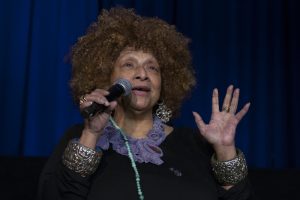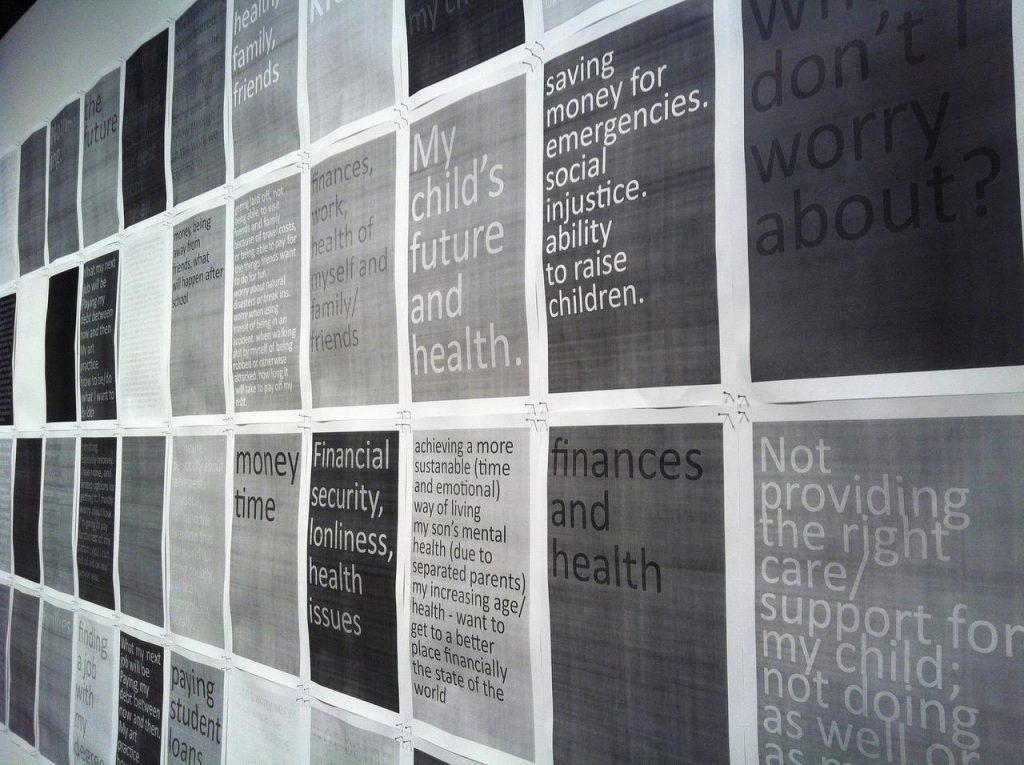CAA News Today
Call for Proposals: Materiality and Mediation: Global Conversations
posted by CAA — May 02, 2022
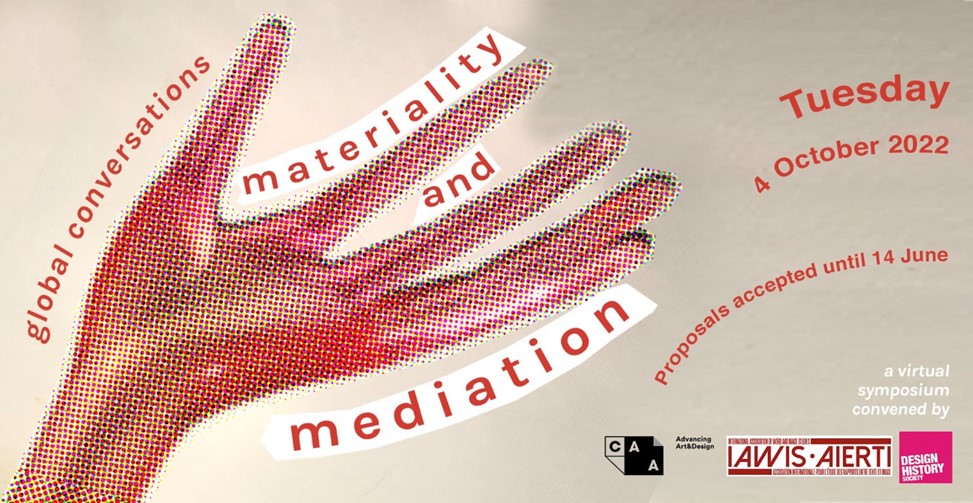
Materiality and Mediation: Global Conversations
Tuesday, 4th October 2022.
A virtual symposium convened by the CAA, the Design History Society, and the International Association of Word and Image Studies
To what extent are materiality and mediation useful foci in the study of design, word and image? What happens when we bring them together? How do materiality and mediation work in tandem as productive subjects of enquiry? What are the local, regional and international variations in the ways these foci are understood and engaged by design historians and those working in word and image studies?
This global collaborative project brings together three intersecting constituencies—art and design, design history, word and image studies—to examine the ways in which materiality and mediation intersect.
- mediating the ethics and sustainability of extraction and deployment of materials
- sensoriality of materials and mediation
- mediation as material activism
- mediating intersections of materiality and form (natural/synthetic/digital matter; art/craft/design/film/photography; prose/poetry/drama)
- localizing/globalizing materials through mediation
- ‘raw and cooked’ materials
- mediating materialities of scale
- mediating immateriality
- mediating materials as signifiers of identity politics
- (Im)material media of mediation
- agency of materials
- dialogues and disputes between makers and mediators.
- a proposal title;
- an abstract of 250 words;
- a statement of relevance to the symposium theme, Materiality and Mediation: Global Conversations;
- and a one-page CV listing major publications.
Please send your proposal via email to the DHS Administrator, Jenna Allsopp, (designhistorysociety@gmail.com) by 12 midnight GMT on Tuesday June 14, 2022. Notifications of acceptance will be emailed on July 8, 2022.
The Design History Society and the International Association of Word and Image Studies are two of CAA’s affiliated societies. If you have an interest in joining CAA as an affiliated society, please visit this page.

CAA 2020 Submissions Portal Now Open
posted by CAA — March 01, 2019
The submissions portal for the 2020 CAA Annual Conference in Chicago, February 12-15 is now open.
CAA invites proposals for sessions, lightning rounds, poster sessions, and workshops from visual arts professionals working across the field in all disciplines.
The CAA Annual Conference is the largest gathering of art historians, artists, designers, curators, arts administrators, museum professionals, and others in the visual arts.
Proposals must be submitted by April 30, 2019.
Please note, this year individuals will have the opportunity to submit proposals for several types of opportunities at the Annual Conference before the April 30 deadline. Please review the full proposals page to decide which type of submission best fits your needs.
The Annual Conference Committee members reviewed over 1,000 submissions for the 2019 Annual Conference. They take into account subject areas and themes that arise from accepted proposals to present as a broad and diverse a program as possible. Last year the committee selected roughly 300 sessions and it must, at times, make difficult decisions on submissions of high merit.
Please contact Member Services at membership@collegeart.org or at 212-691-1051, ext. 1 with any questions.
Call for Responses | Beyond Survival: Public Funding for the Arts and Humanities
posted by CAA — June 19, 2018
Art Journal Open seeks 500-word responses for a Forum on Public Funding for the Arts and Humanities, convened by Sarah Kanouse, Jeremy Liu, Catherine Morris, and Mimi Thi Nguyen.
Moderated contributions will be posted to an online forum hosted by Art Journal Open. Some respondents may subsequently be invited to expand their text into a longer article.
Responses will be accepted through August 20, 2018 to: publicfundingforum@gmail.com
Beyond Survival: Public Funding for the Arts and Humanities
Three decades into the long culture wars, how are artists, scholars, and cultural organizations navigating shifting political, community, and financial tides? Where have we encountered friction or congruence between federal priorities and our work at state, local, and community levels? Has our work changed – in structure, presentation, or substance – in response to these priorities?
Despite threats of elimination earlier in the year, federal funding for the arts and humanities has been preserved—at least for now. While rightly celebrating this collective accomplishment, we must also acknowledge that ideological pressures on US cultural policy are performed as much through selective funding as outright defunding. Each successive presidential administration has stamped its particular priorities on funding agencies, shaping arts and humanities research through both direct and indirect means. The grantmaking models now used by the National Endowment for the Arts and National Endowment for the Humanities were carefully devised to avoid the headline-grabbing controversies of the 1980s culture wars while articulating the value of the arts and humanities to a non-elite, often skeptical public. Simultaneously, arts and scholarly communities have sometimes struggled for diversity in terms of race, class, and gender. Nonprofit cultural and educational institutions evolved alongside twentieth-century funding models, with diminishing federal funding giving way to support from private philanthropy, and its concomitant priorities. Surviving funding programs often expect artistic and intellectual activities to contribute to community development, shore up fraying social services, or emphasize their policy implications—a challenging charge made more difficult by the patchwork of fragile social, economic, community, and technological infrastructures on which such work rests.
In an environment of heightened scarcity and competitiveness, how do we negotiate the differing audiences, priorities, and compromises that inevitably register in creative, academic, and public discourse? How do we defend our existing, imperfect, imperiled institutions while also calling for—and ultimately achieving—more expansive public funding of a wider range of aesthetic and political voices?
We seek 500-word responses to these questions from communities of art-making, scholarship, and exhibition practice. Moderated contributions will be posted to an online forum hosted by Art Journal Open. Some respondents may subsequently be invited to expand their text into a longer article. Responses will be accepted through August 20, 2018 to publicfundingforum@gmail.com.
Sarah Kanouse
Artist and Associate Professor
Department of Art + Design
Northeastern University
Jeremy Liu
Senior Fellow for Arts, Culture and Equitable Development
PolicyLink
Catherine Morris
Senior Curator for the Elizabeth A. Sackler Center for Feminist Art
Brooklyn Museum
Mimi Thi Nguyen
Associate Professor
Gender and Women’s Studies and Asian American Studies
University of Illinois, Urbana-Champaign
Two Sessions at February’s CAA Conference Introduced Topics for the Next International Congress for the History of Art (CIHA)
posted by CAA — March 29, 2018
Paul B. Jaskot, professor of art, art history, and visual studies at Duke University, contributed the following article about upcoming opportunities for CAA members to participate in international art history conferences. Professor Jaskot is a member of the National Committee for the History of Art (NCHA) and a past president of CAA (2008-10).
At the 2018 CAA Annual Conference in Los Angeles, two exciting sessions addressed the theme of international “mobilities” in art history, presenting new research related to Brazil and Italy (and their artistic diasporas). Organized by members of the National Committee for the History of Art (NCHA), each session took up the general topic of mobilities, which will be the organizing concept for the upcoming International Congress for the History of Art. The congress is sponsored by the International Committee of the History of Art (CIHA), of which NCHA is the US affiliate. NCHA acts as representative body to connect the international committee’s work with CAA and its members to sustain the global exchange of art historical work.
In an unusual format, CIHA has approved two official conferences—together comprising the International Congress—developing this theme in order to emphasize the nature of movement and art over time and space. The 2019 meeting will take place in Florence, Italy, and the 2020 meeting will convene in São Paulo, Brazil.
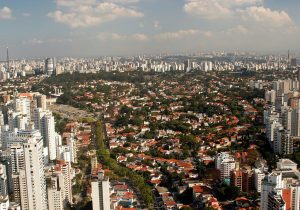
São Paulo, Brazil. Photo: Ana Paula Hirama/Flickr, via Wikimedia Commons
In the same spirit, NCHA decided to sponsor two sessions at the CAA Annual Conference to raise awareness of the upcoming conferences as well as begin to develop US participation. The first session, chaired by Jeanette Favrot Peterson, was entitled “Mobilities: Brazil and Beyond” while the second session, chaired by Elizabeth Cropper focused on “Mobilities: Italy and the New World.” The Brazil session featured Brazilian speakers (including representatives to CIHA) on topics that particularly interpreted mobility as migration in/through Brazil, from the ancient world through contemporary art history and across diverse media. In a complementary but distinct emphasis, the Italian session centered on spatial representations and movements of objects and individuals between Italy and the Americas; like its counterpart, the session had an expansive chronological focus and range of media, from maps to Modernist architecture. In both cases, the sessions emphasized the importance of scholarly exchange between US art historians and the international community, a crucial goal of CIHA, NCHA, and indeed CAA itself, especially through the work of its International Committee and the CAA-Getty International Program.

Florence, Italy. Photo: Felix König, via Wikimedia Commons
Art historians interested in these exchanges can get involved now with the ongoing dialogue. The Call for Chairs for the Florence CIHA 2019 conference has been posted and is open to all (Deadline: April 15, 2018); the Italian Committee has chosen the theme of “Motion: Transformation” as its interpretation of the broader focus on mobilities. The chair selection will be followed by a Call for Papers in Fall 2018. The Brazilian Committee will first issue a Call for Sessions between October and December 2018; the Call for Chairs will be issued in February 2019; the Call for Papers will take place between May and August 2019 with the final program being posted in October 2019. NCHA is developing programming for the CAA 2019 Annual Conference to advertise these conferences and encourage US participation. Stay connected with NCHA and check out the CIHA website for further information! We will continue to post updates in CAA News as well.
CIHA is the oldest continuously held art history conference in the world. In addition to its congresses held every four years, it also sponsors colloquia: more focused gatherings around particular art historical themes that are sponsored by its national committees. On November 27-30, 2018, India will be holding its first colloquium on the topic of “Art, Design, and Society.” Note that the Call for Papers closes May 7, 2018, so there is still time to participate in this conference. Following this, Japan will be organizing another colloquium in 2019 titled “Towards the Future: Museums and Art History in East Asia.” More information will be available as details are finalized. As the colloquia and the congress indicate, there are many opportunities for US art historians to get involved with these international exchanges of ideas.
Call for Papers: Art, Design & Society | CIHA India Colloquium 2018
posted by CAA — March 20, 2018
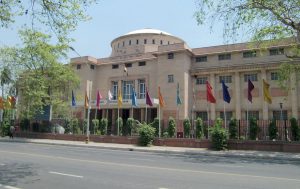
The National Museum Institute (NMI) in New Delhi, India. Image: Wikimedia Commons
New Delhi, India, November 27 – 30, 2018
Deadline: May 7, 2018
ART, DESIGN & SOCIETY
Comité International d’Histoire de l’Art (CIHA) India Colloquium 2018
Art and design are intrinsic to all forms with aesthetic value. In the modern world, the dichotomy between art and design was created by the socio-political and economic changes that were brought about by the industrial revolution and colonization. This has led to the paradoxical paradigm wherein the utilitarian designs of the past are perceived as art in the present and are displayed in museum spaces.
In countries like India, art institutions are products of colonialism which aimed at instilling western values leading to the collapse of traditional structures of art creation, dissemination and consumption. The living traditions of indigenous, popular and ritual art which formed the major corpus of artistic production in societies worldwide went unnoticed in the grand narratives. This led to the exclusion of a vast array of tangibles and intangibles that engendered incomplete perceptions of the past across the world.
This colloquium aims at bringing together the smaller narratives that have often been overlooked but which are nonetheless important parts of the tapestry of humanity. It has also become imperative that we re-examine the notions of art and design to understand the essence of the creative process across various cultures and encourage discussion and discourse on their interface and intersection with society. The colloquium particularly intends to probe the role of categorization and enquire into the very frameworks within which art & design operate.
Against this background, the colloquium would like to call for papers under the following topics:
- Design of the Past: Art of the Present
- Synthesizing the Sacred and the Secular
- Art & Design: Expressions of Conflict and Synthesis in Society
- Utility to Frivolity
- Space, Design & Art
- Power, Politics & Propaganda
- Sustainability: Practice and Production
- Vision, Perception and Interpretation
- Signs & Symbolism in Art & Design
- Prevailing Over Prejudice: Untold Stories
- Interpreting the Intangible Through the Tangible
- Impacting Society: Social & Digital Media
- Harmonizing the Individual and the Collective
- Art History: The Melting Pot
We invite paper presentations of 20 minutes. Please send a title of your proposed paper, an abstract of between 300 and 350 words. Please write the word “Abstract” in the subject line of your e-mail. Submissions must be sent to cihaindia2018@gmail.com
Closing date for the first call for papers: Monday, May 7, 2018
Kindly note that participation in the colloquium will only be confirmed after receipt of payment of registration fee. Click here to register.
CONVENERS:
Prof. (Dr.) Anupa Pande
Professor & Head, Department of History of Art
Director & Pro-Vice-Chancellor, National Museum Institute
Dr. Savita Kumari
Assistant Professor, Department of History of Art
National Museum Institute
Website: cihaindia2018.in
Conference Submissions for CAA 2019
posted by CAA — February 27, 2018
CAA 2019 Annual Conference
February 13-16, 2019
New York, NY
Hilton Midtown
Beginning March 1, 2018, CAA members are invited to submit the following proposals for review to the 2019 CAA Annual Conference Committee: Complete Sessions, Sessions Soliciting Contributors, and Individual Paper/Project proposals. Submissions that cover the breadth of current thought and research in art and art practice, art and architectural history, theory and criticism, studio art, pedagogical issues, museum and curatorial practice, conservation, design, new media, and developments in technology are encouraged.
The submissions portal closed on April 27, 2018.
PROPOSAL SUBMISSION TYPES
Complete Session
The organizer has complete information about the session including names and affiliations of all session participants, presentation titles, abstract texts, etc.
Session Soliciting Contributors
The organizer proposes a session title and abstract that will require a call for participation. The list of accepted Sessions Soliciting Contributors will be posted on the CAA website in late June or early July, 2018. Session organizers select papers and projects based on their own requirements. See CAA 2019 Call for Participation section below for more information.
Individual Paper/Project
An individual CAA member may submit an abstract (with title), which, if accepted, will be included in the 2019 conference as part of a composed session with others accepted in this category based on subject area or compatible content.
OPENS: March 1, 2018
DEADLINE: April 27, 2018 [closed]
Please note: To submit a proposal, individuals must be current CAA members. All session participants, including presenters, chairs, moderators, and discussants, must also be current individual CAA members. Please have your CAA Member ID handy as well as the member IDs of any and all participants as this is a required field on the submission form. Please note that institutional member IDs cannot be used to submit proposals. If you are not a current individual member, please renew your membership or join CAA.
The Annual Conference Committee members review over 800 submissions each year. They take into account subject areas and themes that arise from accepted proposals to present as a broad and diverse a program as possible. The Committee selects between 250-300 sessions for each conference and it must, at times, make difficult decisions on submissions of high merit.
CAA schedules the conference program so that there are back-to-back sessions with similar content. However, given the number of sessions, this is not always possible. All sessions are 90 minutes in length and are scheduled Wednesday, February 13, through Saturday, February 16, in the following timeslots:
- 8:30—10:00 AM
- 10:30 AM—12:00 PM
- 2:00—3:30 PM
- 4:00—5:30 PM
- 6:00—7:30 (Thursday, February 14, and Friday, February 15, only)
CAA AFFILIATED SOCIEITES AND CAA COMMITTEES
CAA Affiliated Societies and CAA Committees may each submit for one guaranteed session in the Complete Session or Session Soliciting Contributors category according to the general session proposal deadlines. Visit Affiliated Society membership for more information on participating in the CAA Annual Conference.
GENERAL PROPOSAL SUBMISSION INFORMATION
- Session and paper/project abstracts should be no more than 250 words in length.
- Please follow the Chicago Manual of Style for your submission.
- The accuracy of information in the submission is important as, if selected, it will be transferred to the conference program, abstracts booklet, website, etc., exactly as written.
KEY DATES
- March 1 – April 27: Call for Proposals (includes Complete Session, Session Soliciting Contributors, Individual Paper/Project)
- Early July: Notifications sent to all submitters
- July: Call for Participation for accepted Sessions Soliciting Contributors posted on CAA website
- End July: Notifications sent to accepted individual paper/project participants regarding composed session configurations
- Late August: Organizers of Sessions Soliciting Contributors finalize session information and notify accepted contributors
- September 4: Deadline for updated accepted session content entered into portal by original submitter for all categories for print and web publications (includes any required edits to abstracts, titles, and speaker order)
- mid-September: CAA 2019 Annual Conference schedule finalized
- October 8: CAA 2019 Annual Conference schedule posted on CAA website; online conference registration opens
- December 16: Early conference registration closes
- December 17: Advance conference registration opens
- February 8: Advance conference registration closes
FORTHCOMING CALLS FOR SUBMISSIONS
Poster Session
OPENS: May 21, 2018
DEADLINE: August 15, 2018
CAA invites proposal submissions for Poster Sessions at the CAA 2019 Annual Conference. Poster Sessions offer excellent opportunities for informal discussion and conversation focused on topics of scholarly or pedagogical research. Proposals require a description of the project (up to 250 words), with a title and member CV.
Exhibitor Session
OPENS: May 23, 2018
DEADLINE: September 14, 2018
Registered exhibitor at the 2019 conference are welcome to propose full sessions or workshops (ninety minutes in length) for inclusion in the full-conference program. These sessions should convey practical information, professional expertise, or historical/scholarly content and may not be used for direct marketing, sales or promotion of products, publications, or services or programs.
Call for Participation for accepted Sessions Soliciting Contributors
The CAA 2019 Call for Participation (CFP) for accepted Sessions Soliciting Contributors will be posted on the CAA Annual Conference website on June 29, 2018. Submissions will be accepted for review through August 6, 2018.
Beginning June 29th, 2018, single paper or project submissions in response to the CFP should be sent directly to the session chair(s)—if there is more than one session chair, send materials to both chairs. Proposals should include a proposal form (found at the end of the CFP), an abstract of your presentation, a cover letter to chair(s), a shortened CV, and work documentation (if necessary).
FREQUENTLY ASKED QUESTIONS
Q: Do I have to be a CAA member to submit a proposal?
A: All conference participants (presenters, chairs, discussants) must be CAA members to participate in the annual conference. A CAA member ID number will be requested for all conference participants in the online submission form. However, if you do not have all CAA ID numbers available for participants, you may enter them when you obtain them. If you are not a member of CAA at the time you submit the proposal, you will not be prevented from submitting. You may work on the submission in stages until the proposal deadline.
Q: Is CAA membership required to participate on a CAA session?
A: Yes, ALL session participants (presenters, chairs, discussants) must be members of CAA in order to participate in vetted conference sessions.
Q: Is CAA membership required to participate on an Affiliated Society guaranteed session?
A: Yes, all session participants (presenters, chairs, discussants) must be members of CAA in order to participate in guaranteed Affiliated Society sessions.
Q: Can someone who is not a CAA member participate in a panel?
A: We require all conference session participants to be CAA individual members.
Q: How long is a session?
A: All CAA 2019 sessions are ninety minutes in length. Please plan either session or paper/project presentations accordingly.
Q: How many people should be on a panel?
A: For a traditional ninety-minute session, we suggest one chair, four participants, and one discussant. This format allows introductions, fifteen-minute presentations, and Q&A. CAA encourages innovative session formats but all session participants must plan accordingly.
Q: How many ways can I participate in conference sessions?
A: To allow a greater number of CAA members to participate in the conference, CAA members can participate in the following roles only once during a conference: chair, presenter, discussant. They can serve in all three roles, but cannot perform any of these roles more than once. For example, they can serve as chair and present in one session, and serve as discussant at another session, but cannot present twice.
Q: Can I attend the session for free if I am presenting on that session?
A: While you cannot attend a session for free, even for the one you are presenting in, we do offer a number of conference registration options including full registration, day passes, and single session time slot tickets.
Q: Can I plan something other than a traditional panel?
A: YES! Feedback from our attendees reveals that they want to take in information and learn in formats other than several people sitting at table in front of a session room. They very much want more interaction with panel participants. We strongly encourage you to think about presenting your content in a manner other than the traditional panel format. While planning your session, you are reminded that we cannot deviate from the ninety-minute time limitation.
Q: Can I have a two-part session?
A: The Annual Conference Committee aims to include as many contributors as possible reflecting the range of scholarship and expertise. In the submission process, please make the request and the committee will evaluate this based on the number of subject areas received as well as the logistical possibilities.
Q: If I am selected to participate as an individual paper/project participant how is my session arranged?
A: Accepted individual paper/projects are organized by the Annual Conference Committee and the CAA staff into what is called Composed Sessions with other individual paper/projects based on subject area or compatible content. Since there is no formal chair for Composed Sessions a mentor is assigned to the group to provide guidance as needed. Sometimes participants identify one in the group to act as chair, sometimes a CAA member outside the group is asked to lead, other groups choose to go without this formal role.
Q: Are there sessions that are free and open to the public?
A: The mid-day time slot (12:30 – 1:30 PM) is free and open to the public. This time slot is reserved for business meetings and special conversations on hot topics for the field. There are other events throughout the conference which are also free. Check the schedule when it is posted in October for details. Please remember to check back often as the schedule is updated as the conference approaches.
For more information about session proposals for the 2019 Annual Conference, please contact Mira Friedlaender, CAA manager of programs, at 212-392-4405 or Tiffany Dugan, CAA director of programs and publications, at 212-392-4410.
Propose a Paper or Presentation for the 2017 Annual Conference
posted by CAA — August 08, 2016
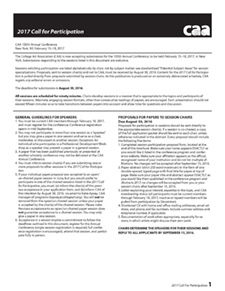 The 2017 Call for Participation for CAA’s 105th Annual Conference, taking place February 15–18, 2017, in New York, describes many of next year’s programs sessions. The chairs of these sessions invite your participation: please follow the instructions in the booklet to submit a proposal for a paper or presentation. This publication also includes a call for Poster Session proposals.
The 2017 Call for Participation for CAA’s 105th Annual Conference, taking place February 15–18, 2017, in New York, describes many of next year’s programs sessions. The chairs of these sessions invite your participation: please follow the instructions in the booklet to submit a proposal for a paper or presentation. This publication also includes a call for Poster Session proposals.
Listing 127 panels, the 2017 Call for Participation is only available as a PDF download; CAA will not mail hard copies of this thirty-seven-page document.
The deadline for proposals of papers and presentations for the New York conference is Tuesday, August 30, 2016. The deadline for Poster Sessions proposals is Thursday, September 15, 2016.
In addition to dozens of wide-ranging panels on art history, studio art, contemporary issues, and professional and educational practices, CAA conference attendees can expect participation from many area schools, museums, galleries, and other institutions. The Hilton New York Midtown is the conference headquarters, holding most sessions, Career Services, the Book and Trade Fair, ARTspace, special events, and more.
Contact
For more information about proposals of papers and presentations for the 2017 Annual Conference, please contact Katie Apsey, CAA manager of programs, or Tiffany Dugan, CAA director of programs.
2017 Call for Participation Now Open
posted by CAA — July 05, 2016
The 2017 Call for Participation for the 105th Annual Conference, taking place February 15–18, 2017, in New York, NY, is now open.
The 2017 Call for Participation describes approved sessions for next year’s conference which are seeking contributions. CAA and the session chairs invite your participation: please follow the instructions in the link to submit a proposal for a paper or presentation directly to the appropriate session chair(s). A call for Poster Session Proposals is also included in this CFP.
The 2017 Call for Participation is only available as a PDF download; CAA will not mail hard copies of this document.
The deadline for proposals of papers and presentations is August 30, 2016. The deadline for Poster Session Proposals is September 15, 2016.
Contact
For questions about the CAA Annual Conference’s 2017 Call for Participation, please contact Katie Apsey, CAA manager of programs, at kapsey@collegeart.org or Tiffany Dugan, CAA director of programs at tdugan@collegeart.org.
Propose a Poster Session for the 2017 Annual Conference
posted by tiffany — March 03, 2016
The deadline to propose a Poster Session is Thursday, September 15, 2016.
CAA invites individual members to submit abstracts for Poster Sessions at the 105th Annual Conference, taking place February 15–18, 2017, in New York. Poster Sessions—presentations displayed on bulletin boards by an individual for small groups—usually include a brief narrative paper mixed with illustrations, tables, graphs, and similar presentation formats. The poster display can intelligently and concisely communicate the essence of the presenter’s research, synthesizing its main ideas and directions. Colorado State University has published useful general information on Poster Sessions.
Poster Sessions offer excellent opportunities for extended informal discussion and conversation focused on topics of scholarly or pedagogical research. Posters are displayed for the duration of the conference, so that interested persons can view the work even when the presenters are not physically present. Poster Sessions take place in a high-traffic area, in close proximity to the Book and Trade Fair and conference rooms.
Proposals for Poster Sessions must include the following:
- Title of Poster Session
- Summary of project, not to exceed 250 words
- Name of presenter(s), affiliation(s), and CAA member number(s)
- A two-page CV of presenter
- Complete mailing address and telephone number
- Email address
Proposals are due by Thursday, September 15, 2016. Send all materials to Katie Apsey, CAA manager of programs. A working group of the Annual Conference Committee selects Poster Sessions based on individual merit and space availability at the conference. (Approximately ten posters may be accepted.) Accepted presenters must maintain their membership status through the conference.
Displays must be assembled by 10:00 AM on Thursday, February 16, and cleared by 2:00 PM on Saturday, February 18. Live presentations last ninety minutes and are scheduled during the lunch breaks on Thursday and Friday, 12:00–1:30 PM. During this time, presenters stand by their poster displays while others view the presentation and interact with the presenters.
CAA assigns presenters one freestanding bulletin board (about 4 x 8 feet of display space) onto which they can affix their poster display and other materials, as well as a table to place materials such as handouts or a sign-up sheet to record the names and addresses of attendees who want to receive more information. CAA also provides pushpins or thumbtacks to attach components to the bulletin board on the day of installation.
Printed materials must be easily read at a distance of four feet. Each display should include the title of the presentation (104-point size) and the name of the presenter(s) and his or her affiliation(s) (72-point size). CAA recommends a point size of 16–18 or larger for body text. No electrical support is available in the Poster Session area; you must have your own source of power if using a laptop or other forms of electronics.
Contact
For more information about proposals of Poster Sessions for the 2017 Annual Conference, please contact Katie Apsey, CAA manager of programs, at 212-392-4405.
The “Olympics” of Art History: CIHA in Beijing, 2016
posted by Paul B. Jaskot — May 12, 2015
Written by Paul B. Jaskot, Nicola Courtright, and Anne Collins Goodyear.
The thirty-fourth World Congress of Art History, organized by the Comité International d’Histoire de l’Art (CIHA), will take place September 15–22, 2016, in Beijing, China. CIHA is a once-every-four-year opportunity to bring the world’s art historians together in what is truly a global exchange of ideas, new approaches, and innovations in all areas of the discipline. As the American affiliate to CIHA, the National Committee of the Historians of Art (NCHA), a group with strong institutional ties to CAA, is happy to encourage any and all interested art historians to get involved. Now is the time to consider applying for one of the twenty-one sections that oversee the creation of specific panels for the upcoming conference. See the NCHA website for more information and for the call for papers.
CIHA traces its roots back to the 1930s, when it was officially founded at the Brussels Congress. The organization has now vastly exceeded its original Euro-American emphasis and currently has national chapters on all the continents. This will be the organization’s first conference in China. In addition to the international gathering held every four years, CIHA also sponsors specific thematic art-history conferences such as the upcoming “New Worlds: Frontiers, Inclusion, Utopias” in Rio de Janeiro, Brazil (August 25–29, 2015).
In China, the broad overarching theme is “Terms” in art history. From there, a range of sessions will cover such topics as “Connecting Art Histories and World Art,” “Media and Visuality,” “Display,” and “Commodity and Markets,” to name just a few of the twenty-one different session topics. Each session is cochaired by an international scholar as well as a scholar based in China. All papers will be simultaneously translated into Chinese, English, French, and German. As with the last CIHA in Nuremberg, Germany, it promises to be an exciting event full of international exchange and chances to explore art and architecture in Beijing and beyond. NCHA hopes that CAA will be well represented and encourages all art historians to consider submitting a paper by the June 30, 2015, deadline.
NCHA was founded to foster participation of US scholars in the international committee, its conference, and other programs. As part of this charge, NCHA regularly provides travel support for US graduate students to the CIHA meetings and will do so again for China. In addition to sending young scholars to the quadrennial conference, NCHA, with generous funding from the Getty Foundation, also initiated a reverse exchange when it began to bring international scholars from Africa, Asia, South America, and Central Europe to the CAA Annual Conference to promote international exchange in the United States as well. That initial effort continues to be a regular part of the CAA conference, now coordinated by CAA and its International Committee with participation of NCHA members.



